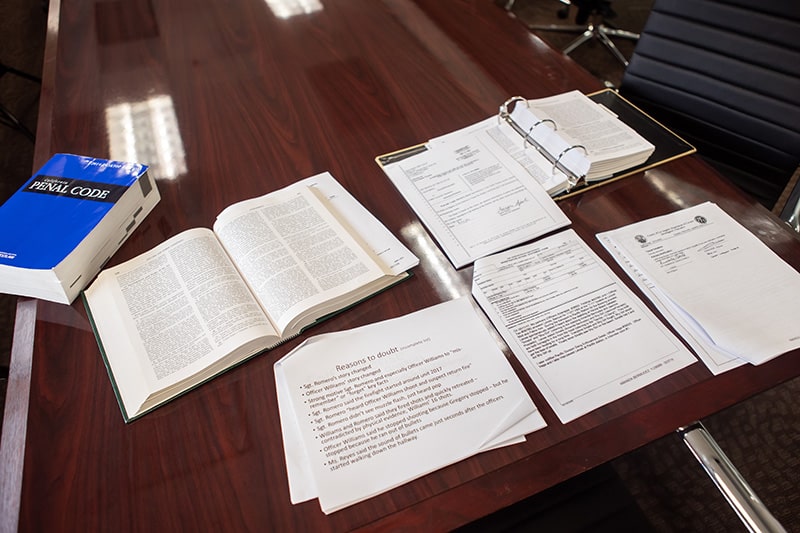What Is a Franklin Hearing?

A Franklin hearing is an evidentiary proceeding in which a person who was convicted of committing a crime while under the age of 26 and who was given a lengthy sentence may introduce evidence related to their youth in mitigation of the sentence. It is an evidence-preservation hearing.
Franklin hearings are complex and require considerable preparation in advance. This is best done by a legal team that will stand by your side throughout the entire process. Award-winning criminal appeals lawyer Aaron Spolin and the attorneys at Spolin Law P.C. have handled many Franklin hearings for clients. We diligently work to gather evidence, tell our clients’ stories, and achieve success at the hearing.
- What Is a Franklin Hearing?
- When Is a Person Eligible for a Franklin Hearing?
- Who Is Eligible for a Franklin Hearing?
- How to Request a Franklin Hearing
- Effective Evidence for a Franklin Hearing
When Is a Person Eligible for a Franklin Hearing?
A Franklin hearing is available if the defendant:
- Was convicted of a “controlling offense”
- Was 25 or younger at the time of the commission of the offense or was under 18 but not treated as a juvenile offender
- Did not have an opportunity at their sentencing hearing to introduce mitigating evidence related to their youth
What Is a Controlling Offense?
To be entitled to a Franklin hearing, the person must have been convicted of a “controlling offense.” A controlling offense is defined as any crime or sentencing enhancement for which a sentencing court imposed the longest term of imprisonment. It is a controlling offense if the defendant was:
- 25 years of age or younger at the time of the offense, and they were given the longest possible determinate sentence;
- 25 or younger and they were given a sentence the minimum of which was under 25 years and the maximum being life in prison;
- 25 or younger and they were sentenced to 25 years to life in prison;
- 17 or younger but not treated as a juvenile offender, and the sentence was life without the possibility of parole (an LWOP sentence).
- What Is a Franklin Hearing?
- When Is a Person Eligible for a Franklin Hearing?
- Who Is Eligible for a Franklin Hearing?
- How to Request a Franklin Hearing
- Effective Evidence for a Franklin Hearing
Who Is Eligible for a Franklin Hearing?
A Franklin hearing is relevant to people who were sentenced prior to 2016 (the year People v. Franklin, 63 Cal.4th 261, was decided) and who did not have an opportunity to submit youth-related evidence in mitigation of the offense. After 2016, California enacted statutes that specifically require consideration of youthfulness factors in sentencing those under the age of 25.
Youthfulness Factors Considered by the Board of Parole
For those sentenced prior to 2016, the youthfulness factors are considered by the Board of Parole Hearings when it determines whether to grant parole. The Board is required to give “great weight to the diminished culpability of juveniles as compared to adults, the hallmark features of youth, and any subsequent growth and increased maturity” when making its decision.
- What Is a Franklin Hearing?
- When Is a Person Eligible for a Franklin Hearing?
- Who Is Eligible for a Franklin Hearing?
- How to Request a Franklin Hearing
- Effective Evidence for a Franklin Hearing
How to Request a Franklin Hearing

A defendant must request a Franklin hearing; it does not occur automatically. The method used is habeas corpus. The inmate must file a writ of habeas corpus in the trial court where they were sentenced and request the hearing, the procedure of which differs from county to county. The court then receives documents and, if appropriate, testimony.
- What Is a Franklin Hearing?
- When Is a Person Eligible for a Franklin Hearing?
- Who Is Eligible for a Franklin Hearing?
- How to Request a Franklin Hearing
- Effective Evidence for a Franklin Hearing
Effective Evidence for a Franklin Hearing
The defendant can put on the record any document, evaluation, or testimony (subject to cross-examination) that will be relevant at their eventual youth offender parole hearing. The prosecution may put on the record any evidence that demonstrates the juvenile’s culpability or cognitive maturity, or otherwise bears on the influence of youth-related factors.
Evidence presented at the hearing should include:
- The age of the defendant at the time of the offense
- The defendant’s cognitive ability
- The defendant’s upbringing and any negative influences in the defendant’s early years
- The defendant’s mental and emotional state at the time of the crime
- The defendant’s maturity level at the time the offense was committed
- The defendant’s juvenile record
- The defendant’s ability to understand the wrongfulness of their conduct
- The defendant’s relative diminished culpability when compared to adults
- The circumstances of the offense
- Subsequent growth and increased maturity while in prison
- The defendant’s potential for rehabilitation
Because the evidence is related to characteristics of the defendant at the time of the offense, the passage of time can negatively impact the ability of the defendant to provide or obtain relevant youth-related evidence. Assembling evidence about what the defendant was like before the crime is more easily accomplished at or near the time of the offense rather than at later parole hearing when memories have faded, records have been lost or destroyed, and family or friends have moved or passed away. The sooner the writ of habeas corpus can be filed the better.
The evidence submitted in a Franklin hearing, both by the defendant and by the state, can come from many sources, such as testimony by family members, friends, neighbors, classmates, teachers, employers, coworkers, clergy, victims, and witnesses. Those who knew the individual before the crime as well as those who know the individual’s growth and maturity since the time of the crime are all relevant witnesses. Evidence may be sourced from documents as well. Records from school, work, mental health care providers, doctors, prison, and experts may all contain relevant evidence.
Requesting the court to appoint an expert to evaluate the defendant and their records can be critical in getting all relevant information on the record. Additionally, an investigator can conduct in-depth interviews with the inmate and family members to provide a picture of the circumstances of the inmate’s childhood and youth.
For the defendant, the purpose of the Franklin hearing is to present compelling evidence that the person’s youthful characteristics played a role in the commission of the offense and that they are capable of rehabilitation. The information presented at the hearing will be provided to the Board of Parole Hearings to consider when the defendant is eligible to be considered for parole. If no Franklin hearing takes place, the Board will not have the evidence and will determine suitability for parole based on other factors.
How a California Criminal Appeals Lawyer Can Help

If you meet the requirements for a Franklin hearing, it’s worthwhile to speak to a California criminal appeals lawyer who can evaluate your case to determine your eligibility and start the process. Spolin Law P.C. has an award-winning legal team that understands the law surrounding Franklin hearings. Law firm founder, Aaron Spolin, has helped countless clients file habeas corpus claims to advance their rights.
Mr. Spolin and his team will work to gather all the evidence possible for presentation at a Franklin hearing and before the Parole Board. They will scour your past for supporting witnesses and documents that evidence your suitability for parole.
To learn more about Franklin hearings and how the law firm of Spolin Law P.C. can assist in your case, call us at (310) 424-5816.
